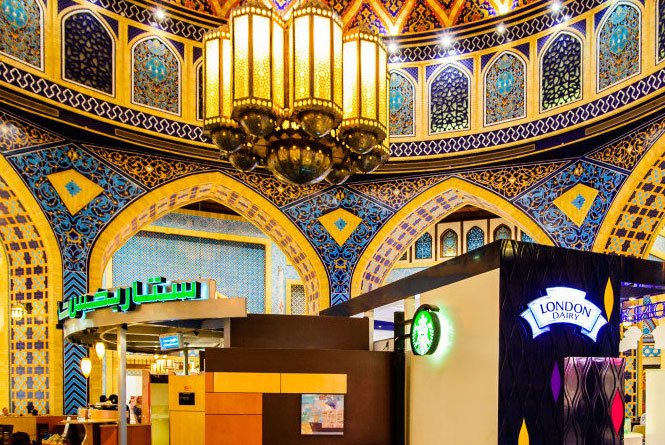Dubai Textile City is an important textile trading center in the Middle East. It is located in the Bur Dubai district of Dubai, specifically at 57 Ali Bin Abi Talib Street. It brings together a variety of textiles, including silk, cotton, embroidered fabrics, etc., attracting a large number of domestic and foreign merchants and designers to come to purchase. Dubai Textile City has a long history and provides a rich selection of textiles. There are not only high-quality fabrics and fabrics from all over the world, but also various buttons, trims, stones, lace and other accessories, which meet the full range of needs from fabrics to ready-made clothes. As the global center for high-end textile re-export, Dubai attracts a large number of exhibitors and buyers every year to showcase the latest textile products and designs.

The economy of the Middle East mainly relies on oil exports, and light industrial products such as textile fabrics and products are basically imported, with a total annual demand of 11.4 billion US dollars, the highest per capita demand in the world. In addition, more than 80% of the goods in the Middle East will be transferred to most parts of Africa, with a population of 1.3 billion. This market demand provides a broad market space for the Textile City.
Dubai implements a free and stable economic policy, encouraging foreign capital to invest in various economic fields such as commerce, industry and services. Foreigners registering enterprises in Dubai Free Zone have no market entry restrictions, can own 100% of the shares, and have no trade barriers and foreign exchange restrictions. These preferential policies have attracted a large number of investors and further promoted the development of Textile City.
Dubai has further strengthened its strategic position in international trade by building a sound infrastructure, improving government service efficiency and providing public services. These efficient facilitation measures have effectively promoted the growth of various economic sectors, social development and the improvement of people's living standards.
Dubai hosts several international textile exhibitions every year, such as the 2025 Middle East (Dubai) International Textile Exhibition. This biannual event provides textile companies with an excellent platform to showcase their products and meet buyers. The exhibition attracts high-end manufacturers from all over the world to showcase a variety of fabrics, accessories, clothing and home textile products. These exhibitions not only showcase the latest products and technologies, but also promote international trade and cooperation.
Dubai Textile City has dozens of markets and stalls, offering a variety of fabrics, silks, brocades, etc. In addition, there are various accessories and ready-made clothes to suit various business needs. The market is well-equipped and has many merchants, providing a rich selection and a convenient trading environment.
Dubai Textile City is located in the Bur Dubai area, with convenient transportation and many bus and subway stations around. There are also many restaurants and cafes around the market, which is suitable for rest and dining after shopping.
The main steps and required materials for registering a company in Dubai Textile City are as follows:
1. Company name approval: First, you need to prepare 1-3 English company names and make sure that the name does not contain words prohibited by the local government. Apply for name approval from the UAE Intellectual Property Office 12.
2. Shareholder and director information: Shareholders: At least 1 shareholder is required. Directors: When registering a company in Dubai Free Trade Zone (such as Jebel Ali Free Zone), at least 2 directors are required. Personal information: Shareholders and directors need to provide personal information, including passport scans, tourist visa or residence visa scans (if applicable), UAE ID cards (if applicable) and contact information (email, phone), etc.
3. Company type selection: Choose the appropriate company type according to business needs, such as sole proprietorship, limited liability company, joint stock company, etc. Different company types may differ in shareholder liability, taxation, etc.
4. Registered capital: There is no minimum registered capital requirement for a limited liability company, but some industries may require local people to hold shares. Other types of companies have minimum registered capital requirements.
5. Articles of Association and Business Plan: Prepare the Articles of Association, business plan and the audit report for the most recent year (if applicable).
6. Registered Address and Agent: A local registered address and registered agent are required.
7. Other requirements: The company secretary can be a registered agent.
8. Tax information: Dubai's tax framework includes value-added tax, corporate income tax and dividend tax. The standard rate of value-added tax is 5%, the corporate income tax rate is 9%, and Dubai is exempt from personal income tax and dividend tax.
By following the above steps and preparing relevant materials, you can successfully register a company in Dubai Textile City.










Zhuoxin Consulting relies on its Chinese service network and Dubai executive team to provide professional one-stop business services without communication barriers for Chinese companies to enter the Middle East market. Its business covers company establishment and maintenance, accounting and taxation, bank account opening, PRO services and business services.
Zhuoxin Consulting has high-quality business resources and maintains close cooperation with many free zones, bankers and tax departments in the UAE to escort your expansion in the Middle East market.
 Add WeChat
Add WeChat